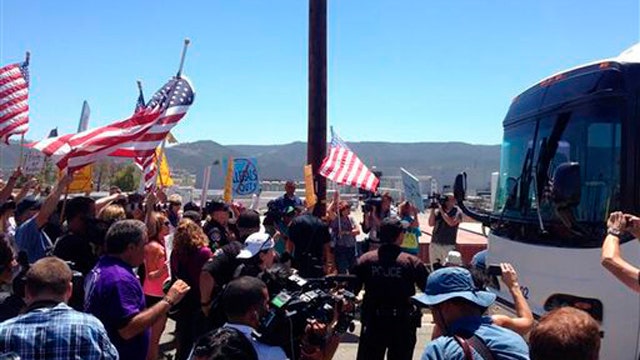Citizens vent anger over transfers of illegal immigrants
Tempers flare at rowdy town hall meeting in Murrieta, California
LOS ANGELES – When American flag-waving protesters forced busloads of migrants to leave Murrieta earlier this week, the Southern California city became the latest flashpoint in an intensifying immigration debate that could heat up even more as patriotism surges on the Fourth of July.
The city's mayor has become a hero to those seeking stronger immigration policies with his criticism of the federal government's efforts to handle the thousands of immigrants, many of them mothers and children, who have flooded the Texas border.
Some of those immigrants were flown to California and were supposed to be processed at a Border Patrol facility in Murrieta, a fast-growing community in the conservative-leaning Inland Empire region. But protesters blocked the road, forcing federal officials to take the immigrants elsewhere.
A second protest is planned for July 4, when another convoy of buses with immigrants is rumored to arrive.
"We've had it," said Carol Schlaepfer, a retired Pomona resident who protested Tuesday in Murrieta. "We all want a better life. ... You can't come to our country and expect American citizens to dole out what you need, from grade school till death."
People on both sides of the issue want immigration reform, but immigrant rights advocates say anti-illegal immigration protesters chastise the mostly women and children crossing the border.
"It's sad that some community members don't see the big picture," said Luz Gallegos, co-founder of the immigration legal aid center TODEC in nearby Perris.
Thousands of children and families have arrived on the Texas border in recent months fleeing violence, murders and extortion from criminal gangs in Guatemala, El Salvador and Honduras. Since October, more than 52,000 unaccompanied children have been detained.
The crunch on the border in Texas' Rio Grande Valley prompted U.S. authorities to fly immigrant families to other Texas cities and to Southern California for processing.
The Border Patrol is coping with excess capacity across the Southwest, and cities' responses to the arriving immigrants have ranged from welcoming to indifferent. In the border town of El Centro, California, a flight arrived Wednesday without protest.
The same day, 140 miles north in Murrieta, an overflow crowd filled a school auditorium for a town hall convened on immigrant arrivals. Those in the crowd chanted "Send them back!" at a Border Patrol official.
Some local leaders said the outrage among some area residents is justified, given the already stressed social services infrastructure and the stagnant Inland Empire economy. Murrieta has a population of about 106,000.
"It's not the 140 we're concerned about," Riverside County Supervisor Jeff Stone said of the number of people on the three buses turned away by Murrieta protesters. "It's the thousands more that will follow that will strain our resources and take away the resources we need to care for our own citizens."
More protests are expected in the city Friday as rumors circulate of another convoy of immigrants arriving at the border patrol station there. The Murrieta Police Department plans to have additional staff in place, Lt. John Flavin said.
The Department of Homeland security said that because of security concerns, it will not publicize immigrant transfers among border patrol facilities.
Elsewhere in the Southwest, hundreds of children are being dropped off daily at a large Border Patrol warehouse in Nogales, Arizona. Residents there have lent a hand.
The city that sits on the border with Mexico collected dozens of boxes of clothing and other items donated by Nogales residents who wanted to help. The city's mayor, Arturo Garino, has said he welcomes the children and wants to assist them in any way he can.
In New Mexico, one of a few states that grants driver's licenses to immigrants who entered the country illegally, residents have been less enthusiastic about taking on the burden.
At a town hall meeting this week, Artesia residents spoke out against a detention center that recently started housing immigrants there. The facility holds women and children migrants while immigration officials work on deporting them. It can house up to 700 people.
Residents told authorities they were afraid the immigrants would take jobs and resources from U.S. citizens.










































